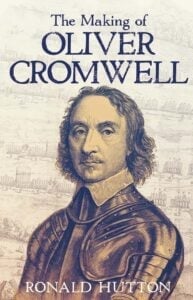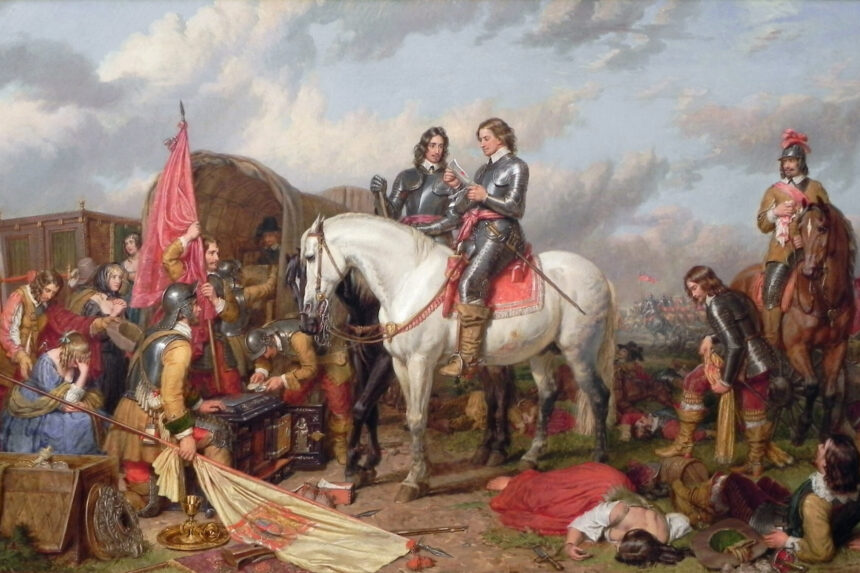
The Making of Oliver Cromwell
by Ronald Hutton
Yale University Press
432 pp., $35.00
If you know anything about Oliver Cromwell—and few do nowadays—you probably have an opinion about the man. Some vilify him; “A curse upon you, Oliver Cromwell, you who raped our Motherland,” the Irish rock band The Pogues sang. Others praise him as an enemy of arbitrary rule and a proto-republican. Ronald Hutton’s new biography of Cromwell’s early life and his climb to prominence makes no final judgment on the man, but it does offer a nuanced view of this complex historical figure. From Hutton’s excellent book we get not just history but the realization, in this desiccated age, that men such as Cromwell always emerge during great turmoil, rising as if from sown dragon’s teeth.
Though it is more academic than a popular history, the book is nonetheless very readable. This is so because Hutton wisely focuses on his subject and makes no attempt to tease out the political and social complexities behind the Civil War. He expertly evokes the England of the mid-17th century, both in politics and in the natural world. Quite often while narrating a particular historical event, Hutton describes in detail the flora of the region and season, which makes the reader feel more immersed in the story, as if he were there. It also brings to the mind’s eye a lost time and a lost country, before industrialization, liquid modernity, and alien invitees destroyed both the English landscape and England’s ancient culture.
The short version of Hutton’s biography is that Cromwell “was both godly and wily, and the two seem at times to jar with each other.” No doubt this is often true for a godly man called to be a temporal leader. Hutton believes that most Cromwell biographers focus too much on the godliness and too little on the wiliness.
Until age 40, Cromwell lived as an obscure provincial, a collateral descendant of Thomas Cromwell, Henry VIII’s minister who fell from grace. In his 30s, Oliver became a devout Puritan, something about which we know very little. (While he left voluminous public words, Cromwell kept no archive of correspondence and thus no record of his private thoughts.) Hutton fleshes out what we can know about Cromwell’s life in the East Midlands, in and near Huntingdon, prior to 1640. There was no reason at that time to expect great things from Cromwell; he was on the lower rung of the gentry, a man of no importance. In fact, for a time he worked the land directly as a tenant farmer, until he inherited money from his uncle.
The uncle was crucial: He had no children, and he kept Cromwell in his will even though Cromwell had tried unsuccessfully to get the uncle declared mentally unfit so as to acquire the older man’s wealth sooner. This is one of the few documented mentions of Cromwell prior to his public emergence, and the incident shows Cromwell’s devious streak. His remaining in the uncle’s will also shows Cromwell’s good luck, though Cromwell himself called it Providence. Other records show early local political involvement that reveals an impetuous streak. After a dispute, Cromwell sold everything he owned and precipitously left Huntingdon entirely.
In 1640, again under obscure circumstances, Cromwell was elected to Parliament as a candidate from Cambridge, which had a strong Puritan element and was 15 miles from Ely, where Cromwell had moved. This Parliament was the Short Parliament, so called because it lasted only three weeks until Charles I dissolved it for its failure to vote him necessary new taxes. But by the end of 1640, Cromwell was again elected, this time to the Long Parliament, which would sit, in various iterations, until 1660. Hutton expertly sketches the processes and procedures of Parliament, as well as the essential issues in the growing conflict between Parliament and King.
Yet again, we have little specific knowledge from this period about Cromwell himself; Hutton uses the phrase “it is not clear” and variations on it repeatedly. What is clear is that Cromwell worked hard and became closely associated with the Puritan factions in Parliament and especially with the “independents,” who opposed state control of preaching (that is, they opposed the Presbyterians). Cromwell gave speeches that were forceful, even violent, and highly emotional. He would, in modern psychological terms, score very low on tests of “agreeability.” But his approach was successful, and that raised his profile.
For the next two years, 1640-42, relations between Parliament and King deteriorated, and the countryside began to separate into armed factions. When Charles sought to fund himself by asking for donations from Cambridge colleges, Cromwell returned to Cambridge, apparently on his own initiative, and raised a militia, successfully preventing the dispatch of gold and silver to the King. Soon Cromwell was formally commissioned a cavalry officer in the army being raised by Parliament, and so he remained for the entire war, rising ever higher in rank.
From 1642 until 1646, the end of the period covered by Hutton’s book, Cromwell alternated vigorous military activity with political activity. He remained a member of Parliament, which, in order to resolve a dispute between the Lords and the Commons in 1645, forbade members to also be military officers—but Cromwell alone was given a dispensation. This was meant to be the very temporary meeting of an immediate critical need, not an acclamation of Cromwell, who had made plenty of internal enemies. But as it happened, Cromwell’s greatest military successes immediately followed and they occurred at the most crucial period of this first phase of the Civil War, so he continued both to lead soldiers and to serve in Parliament. This lucky confluence of events was what ultimately made the Cromwell of history.
Cromwell’s rising political power wasn’t due just to military victories, however. The English Civil War saw the birth of war propaganda, and his friends made sure that he received a disproportionate share of credit and that his accomplishments were inflated, whether in battle or in the prevention of supposed plots by royalists and papists. Cromwell himself was a tireless self-promoter, although, naturally, he believed such salesmanship was also promoting the aims of God. He more than once used his propaganda machine to throw his fellow officers under the bus when Parliament lost a battle. Still, Cromwell was a brave, competent, and lucky commander, highly intelligent and blessed with a durable middle-aged body, and the scale and scope of his actual achievements increased as the war ground on.
Little of Cromwell’s personal life appears in these pages because little is known, but a few glimpses emerge. He was very happily married. Two of his sons died as young men. Characteristically, he turned to Scripture for solace when his oldest son died, writing that it “went as a dagger to my heart, indeed it did.” There are a few biographical details like these, but Hutton focuses primarily on Cromwell’s ability to learn from mistakes and experiences. This was certainly true of his tactical skills, as Cromwell, a man with no military experience before the war, came to better understand the use of cavalry in battle. For example, he learned not to allow his men to chase fleeing elements of an otherwise-unbroken opponent.
Cromwell applied the same principle to how he dealt with political enemies. Although he had a vicious streak, exacerbated by belief in his own righteousness, he learned to calibrate the treatment of defeated enemies in order to maximize future peace as well as his own power. Like the Roman Sulla, he promoted his friends and punished his enemies, with careful calculation in both cases.
What should perhaps be most interesting to us in our own unsettled times—marked by the ever-looming possibility of civil conflict—is how Cromwell embodied what most 21st-century Americans deny exists: Carl Schmitt’s sharp distinction between friend and enemy. We have absorbed the peculiar idea that if we must love our enemies, we must deny that we have any enemies. This would have greatly perplexed Cromwell. Even when he managed to tamp down his natural bloodthirstiness, he would not have deluded himself to think that his enemies were not his enemies. Such an acceptance of reality as he possessed, however, does not have to mean total war. Cromwell, for example, defused the threat of the Clubmen—country dwellers who took up makeshift arms against both King and Parliament—by seizing the leaders and sending everyone home rather than by slaughtering them. Knowing your enemy, as Cromwell demonstrates, means seeing clearly and taking decisive action to achieve the necessary result.
Invariably, Cromwell strongly defended his soldiers accused of straying from the established Church. As Hutton says of one such incident, “He rejected accusations against them of being partisan and divisive as jealously provoked by their godliness and good discipline.” This, along with his battle-winning ways, earned him strong loyalty from his men and a unique power base, something of much use to him after Charles was defeated and conflicts within the Parliamentary side came to a head.
But we do not learn about those later events here. Hutton ends his book in 1646, after the Battle of Naseby, with Charles in captivity but before the final spasms of violence and the subsequent execution of the King, and years before the Protectorate. The author apparently intends two more volumes to cover the remainder of Cromwell’s life; if this present book is any indication, those will be very much worth reading.
Top image: “Cromwell in the Battle of Naseby in 1645,” an 1851 oil painting by Charles Landseer (public domain / Alte Nationalgalerie in Berlin)

Leave a Reply